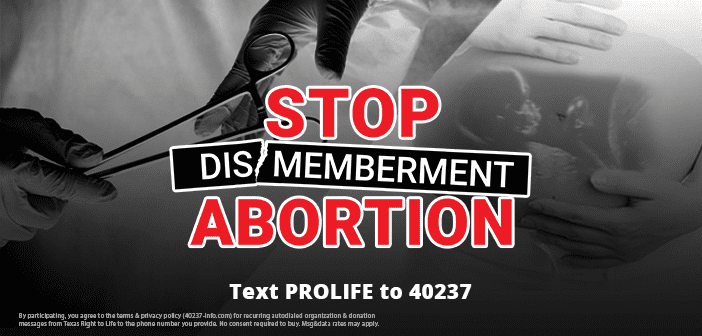By: Jackson Milton
Four years ago, Texas passed a law banning the practice of dismemberment abortion—a particularly hideous way to kill a preborn baby. Yet, for these last four years, the Dismemberment Abortion Ban (DAB) has labored through a protracted court battle, blocking enforcement of the measure, which prohibits the live dismemberment of the smallest of human beings. That changed in August when a federal appeals court ruled that the DAB is constitutional and that Texas can enforce the law. The ruling both identified myriad inexcusable errors in the lower court’s reasoning and serves a pedagogical purpose for the Pro-Life movement.
This unabridged legal saga originated in the halls of the Texas Legislature, where the DAB passed with bipartisan support. Republicans and even some Democrats believed tearing a living child apart limb-from-limb is a heinous and intrinsically intolerable practice—a belief not shared by the abortion industry. Rather than comply with the law, the abortion industry did as they naturally do and sued to stop the DAB from going into effect, and they knew precisely which venue would furnish them the artificial victory they so eagerly craved. Judge Lee Yeakel, a federal judge in Austin, indeed sided with the abortion industry, enabling the perpetuation of dismemberment abortions. The DAB never went into effect, but the legal battle was just beginning.
Yeakel’s ruling was scarcely unexpected. The real struggle was in the United States Court of Appeals for the Fifth Circuit, to which Attorney General Ken Paxton quickly appealed the case. Among the randomly assigned panel of three were two judges appointed by Democrats, an unlucky affair in a circuit court dominated by Republican-appointed justices. They agreed with Yeakel. But Judge Don Willet, in dissent, asked the full Fifth Circuit to take the case en banc. They did, and the Fifth Circuit reversed Yeakel’s ruling, finding his writing was so riddled with errors that his ruling was legally untenable on at least four bases. Each was sufficient to reverse his decision and is worth expounding.
First, “the district court applied an incorrect legal test to assess [the DAB].” In his ruling, Yeakel weighed the benefits and burdens of the DAB, concluding the balance of this test resulted in the unconstitutionality of the statute. However, the Fifth Circuit notes that no such balancing test exists today, nor did one exist in 2018 when Yeakel first ruled. As Chief Justice John Roberts has observed, such a test is a subjective and futile exercise divorced from neutral legal principles. Perhaps that was why Yeakle was so inclined to adopt the balancing test.
Second, Yeakel dismissed the state interests at play. He strikingly asserted that Texas had no state interest in banning dismemberment abortions because the babies are destined to die anyway. This pronouncement is absurd and explains, for example, neither why debate rages over the methods of capital punishment in the United States nor why physicians administer pain medication to a dying patient. Dying matters, and how someone dies also matters. The Supreme Court has affirmed states have an interest in banning the most barbaric aspects of abortion.
Third, Yeakel failed to consider other methods of abortion that render live dismemberment unnecessary and exaggerated burdens before pregnant mothers seeking elective abortions. He ignored factual testimony that indicated other, less gruesome abortion procedures were available when dismemberment abortion was the most common. Yet, when Yeakel accepted other abortion procedures might exist, he quickly dismissed them as too burdensome, flatly contradicting Supreme Court precedent.
Finally, Yeakel botched elementary algebra when he determined to whom the DAB applied and for whom the law is an unconstitutional burden. Because of this, Yeakel’s finding that the law is facially invalid is also rooted in mathematical error.
With the Fifth Circuit’s decision, Texas is the first state to successfully ban dismemberment abortions. Federal courts have enjoined all others. The abortion industry retains the right to petition the Supreme Court to review the case, but they probably won’t. Everyone is anticipating a Supreme Court ruling for another lawsuit over an abortion ban, so any petition from the abortion industry is likely to fail right now.
Beyond the victory for preborn children, the lesson of this lawsuit is that lower courts are typically intensely hostile. The abortion industry venue shops to locate a judge likely to hand them the win. But appeals courts are always much more favorable for the Pro-Life movement. This is certainly true for the DAB, which went into effect on September 9. Getting past Yeakel and other pernicious district judges might pose an initial challenge, but their rulings are never the end of the line.



